Remembrances for some of the people who played roles in Eva’s musical story.
KENT WOOD, 1967-2005:
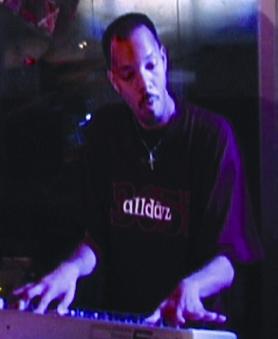 Chris Biondo wrote the following in the Guestbook on January 2, 2006:
Chris Biondo wrote the following in the Guestbook on January 2, 2006:
I just received the sad news that Kent Wood died in a car accident on New Year’s Eve. Kent was a great friend of Eva’s. He played keyboards when Eva and Chuck Brown played together, and played on the very first Eva Cassidy band gig in front of the Willard Hotel in the summer of 1990. He played piano for Eva when she sang “What a Wonderful World” at her Bayou tribute concert. He cried when he heard that Eva was dying.
Kent’s keyboard work can be heard on “The Christmas Song” duet with Chuck, the synth horn arrangement on “I Could Have Told You So”, the organ on “Wade in the Water” and the electric piano on “Wayfaring Stranger”. He was in the studio when she sang “Blues in the Night” and convinced her to try a more powerful take on the vocals, which pushed her to sing like she never had before. Kent also helped me finish Eva’s music after she died. He was one of the best musicians I ever knew.
Kent Wood was best known for his keyboard and vocal work with the go-go groups EU (“Experience Unlimited,” which was seen and heard in the Spike Lee film “School Daze”) and Rare Essence. Many thanks to Rare Essence for permission to reproduce this photo.
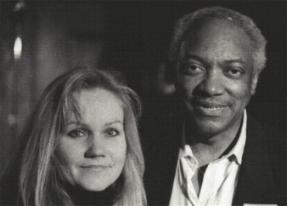
AL DALE 1937-2017:
Alfonzo “Al” Dale died on March 8, 2017. Al was Eva’s manager from 1988-1996. He worked tirelessly to book local jobs for Eva (including Blues Alley) and to try to get her a record deal. They had a warm and positive relationship. “Eva was like a daughter to me,” he told me once. You can hear Al’s voice on LIVE AT BLUES ALLEY, saying “Let’s have a big Blues Alley welcome for Miss Eva Cassidy!” Here’s a link to an interview I did with Al in 2001.
Al Dale is mentioned in this 1998 article by Jefferson Morley in the Washington Post Magazine, and in this 2015 article by Dave McKenna for the Washington Post.
KETER BETTS 1928-2005
 Jazz bass legend Keter (rhymes with Peter) Betts passed away on August 6, 2005, at his home in Silver Spring, Maryland. The Washington Post contains an eloquent article about Keter Betts, written by Richard Harrington. “Jazz elevated Keter Betts to worldwide renown of his own and he in turn elevated everyone fortunate enough to be around him.” Best known for his long partnership with Ella Fitzgerald, the name of Keter Betts will be familiar to Eva Cassidy fans from the musician credits on THE OTHER SIDE, because he played on “I Could Have Told You So” and “You Don’t Know What Love Is.” It was Chuck Brown who brought Keter to the project, recalls Chris Biondo: “Chuck and Keter go back a long way.” Keter was also one of the many participants in the Eva Cassidy Tribute Concert at the Bayou. On that occasion he performed with Eva’s friend Meg Murray. “Keter loved the way Eva sang ‘Blues in the Night,'” Biondo recalls. “He told me that the test of a good singer was whether or not she could hit the bridge in that song. He thought Eva nailed it.” In 1994 Keter Betts was inducted into the “WAMA Hall of Fame.” (Added August 9, 2005)
Jazz bass legend Keter (rhymes with Peter) Betts passed away on August 6, 2005, at his home in Silver Spring, Maryland. The Washington Post contains an eloquent article about Keter Betts, written by Richard Harrington. “Jazz elevated Keter Betts to worldwide renown of his own and he in turn elevated everyone fortunate enough to be around him.” Best known for his long partnership with Ella Fitzgerald, the name of Keter Betts will be familiar to Eva Cassidy fans from the musician credits on THE OTHER SIDE, because he played on “I Could Have Told You So” and “You Don’t Know What Love Is.” It was Chuck Brown who brought Keter to the project, recalls Chris Biondo: “Chuck and Keter go back a long way.” Keter was also one of the many participants in the Eva Cassidy Tribute Concert at the Bayou. On that occasion he performed with Eva’s friend Meg Murray. “Keter loved the way Eva sang ‘Blues in the Night,'” Biondo recalls. “He told me that the test of a good singer was whether or not she could hit the bridge in that song. He thought Eva nailed it.” In 1994 Keter Betts was inducted into the “WAMA Hall of Fame.” (Added August 9, 2005)
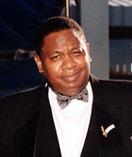
HILTON FELTON, 1947-2007
A well-known local piano room artist, jazz bandleader, and organist, Hilton Felton also worked with Chuck Brown and the Soul Searchers and appears on some of Eva Cassidy’s recordings. His bio on his web page mentions his connection with Eva: “One of his proudest recordings is his organ work on Golden Thread with the late vocalist Eva Cassidy whom he greatly admired.” I asked Chris Biondo to tell me a little more about Hilton Felton and Eva. He told me, “He was a sweet, sweet man. I met him when he came in to play organ on one of Chuck Brown’s songs, and I got his phone number. Eva wanted Hammond organ on ‘Golden Thread’ so we called him up. I think all the organ accompaniment on that song is all first-take stuff, and we added the organ solo later. Later we brought him back again to record organ parts for the two Chuck-and-Eva Christmas songs. After that Eva did a New Year’s Eve gig with him at the club where he played on Pennsylvania Avenue — he had a trio and invited her to be the vocalist. Eva really liked him.” This article appeared in The Washington Post.
ISABEL CASSIDY BLIGH, 1933-2016
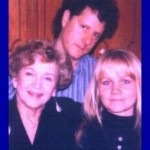
A few weeks before the taping of the live album at Blues Alley, Isabel pulled Eva aside at the family Thanksgiving gathering and handed her a check. She said, “Eva, I know you are going to have a lot of expenses for making this recording, so take this, and I don’t want to hear any more about it.” Eva used that money to pay for the manufacture of the CDs.
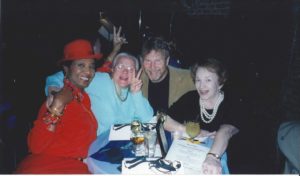
To the end of her life, Isabel kept an “Another Eva Cassidy Fan” bumper sticker on her car, and listened to Eva’s music with joy and love.
The memorial service for Isabel Cassidy Bligh was held on Saturday, January 28th, 2017, at 11:00 AM, at the Mount Vernon Unitarian Church. It was a very lovely service. Among the musical highlights were Eva’s brother Dan Cassidy’s performance of a beautiful composition of his own, “Ode to Isabel,” and Dan and my son Paul Alan Hogan, another family singer-songwriter, did a wonderful arrangement of Isabel’s favorite Unitarian-Universalist hymn, “Spirit of Life.”
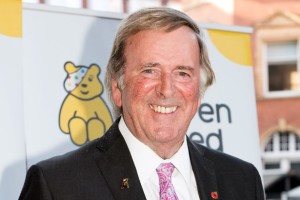
SIR TERRY WOGAN 1938-2016
British broadcast giant Terry Wogan died January 31, 2016, after “a short but brave battle with cancer.” He was 77.Sir Terry was indisputably the most important and influential person to bring Eva’s music to the attention of the British public. He featured Eva’s “Fields of Gold” and “Over the Rainbow” on his immensely popular BBC programme, “Wake Up With Wogan,” with spectacular results! . Here’s a good article about him from The Guardian.
The headlines called him “A National Treasure.” Those of us outside the United Kingdom and the Republic of Ireland cannot fully comprehend what a broadcasting phenomenon Wogan was. When I first heard about his important role in the Eva Cassidy story, I asked many people to list an equivalent force in American media, but nobody was able to come up with any. He was unique. Larry King? No, though he seems to have been as recognizable; not Walter Cronkite, not Bob Hope, though as warmly beloved. Over his long career, Wogan raised hundreds of millions of pounds for BBC’s “Children in Need” charity. He hosted the Eurovision Song Contest for decades. Among his BBC programmes for TV and radio were chat shows, quiz shows, music shows, and narrator roles on documentaries. He was surely one of the most recognizable voices ever. Of particular note to Eva Cassidy fans, Terry Wogan was the narrator of the BBC Radio tribute to Eva, produced by Kevin Howlett. That radio program is my own favorite of all the Eva tributes, and wouldn’t it be lovely if it were available in the United States or online?

BBC PRODUCER PAUL WALTERS 1947-2006
From the BBC web site: “Paul Walters, long-time producer of Sir Terry Wogan’s Radio 2 breakfast show, has died in hospital aged 59 following a long illness.” Those of you who have followed the “Eva story” for a long time are aware that, as Les writes, “Paul Walters was an incredibly important link in the chain that led Terry Wogan to play Eva on UK radio.” After the sad news became public, Terry Wogan opened his morning program with Eva’s “Over the Rainbow” as a tribute to his late producer. Joe writes, “Well it just had to be Eva who was first to be played by Terry this morning – would have been no other I guess. After a very affectionate tribute to Paul from Terry – all the songs this morning are dedicated to Paul. Once Eva sang Over the Rainbow – Terry spoke about Eva and how Paul had introduced Eva to the British public – the rest as they say is history.”
Steve in York directs us to the comment page on the BBC web site: “Did you see how many people have stated their indebtedness to Paul Walters for introducing them to Eva Cassidy? I set my browser to search for the string ‘Eva’ then lost count of the number of matches it found.” Steve also tells me that Bob Harris closed his Saturday night program with Eva’s “Fields of Gold” in honor of Paul Walters.
Pat D. reminds me that I have Paul Walters to thank for my proud possession of a “BBC Radio Two” shirt. (Yes, I did thank him at the time too.) Pat writes, “It was with great sadness tonight that I heard about the passing of Pauly (Dr Wally) Walters…. As you know he is an integral part of the ‘Eva Story’ as well as being a brilliant character in his own right. Sir Terry described him today as ‘the best programmer in the world’ …who would argue?? Terry added, ‘To know Paul Walters was to love him. His character was in his smile.’ I well remember contacting him and his immediate warm reaction and instantly sorting out a ‘TOG sweat shirt’ for you…. I am picturing his mischievous smile on meeting Eva and him probably saying something like… ‘Now I can hear you for real.’ Rest well Pauly and thanks for your talent and insight… you will be missed….”

Susanne S. Millsaps 1953 ~ 2006
Radio host Susanne Millsaps was an early fan of Eva’s music and probably played more of Eva’s songs on her show than any other U.S. radio announcer.
Susanne wrote in the Eva Guestbook in 1999, ‘Eva was an incredible talent, and I feel very fortunate to have stumbled across her music. Recently when Salt Lake City was slammed by a freak tornado, I had the privilege? duty? of putting our radio station, KRCL 91FM, back on the air during my show, Thursday Breakfast Jam. I used Eva’s “Somewhere Over the Rainbow” to start sending our signal out again the morning after all that devastation, and lots of my listeners called to say how comforted they felt by that version of that song. Even after she’s gone,
she’s still giving gifts to so many of us!’
From her obituary in the Salt Lake Tribune: “One of the great women of this world, Susanne Millsaps, died of a cerebral hemorrhage on October 20, 2006. The bleeding was a consequence of her valiant 23 1/2 month struggle with metastatic breast cancer. Although she lived most of her adult life in Salt Lake City, she always showed her New York roots in her direct ways and her willingness to actively challenge injustice or inhumanity….” Susanne was the host of a folk radio program called the “Thursday Breakfast Jam” on KRCL in Salt Lake City for thirteen years. Her husband Grant wrote, “She was one of the bright angels of our world, and it is dimmer without her. We all have to shine brighter to make up the difference.”
GRACE GRIFFITH, 1956-2021
Lovely Grace Griffith passed away on June 6th, 2021. As many of you know, she was a supremely gifted singer, who also played an important role in the Eva story.
Eva’s friend Elaine Stonebraker was present at Grace and Eva’s first and last meetings. In her own words (used by permission):
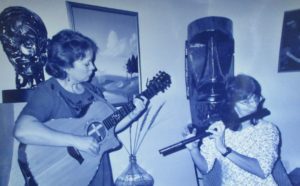
Grace Griffith was largely responsible for bringing Eva Cassidy’s music to the attention, finally, of someone in the position to allow her to flourish. Blix Street Records signed Eva on, after others, like Blue Note, passed on the opportunity because they could not pigeonhole her.
I’d introduced Eva to Grace’s music one night at one of the wonderful “Tavern Nights” at St. Mary’s City. We sat in the front row, feet from Grace. And when, as an encore, she sang a song I’d heard for the first time, just the night before ( Ewan McColl’s “Joy of Living”, written just before he died, Grace saw my open mouthed amazement, and she smiled.
Eva knew a good thing when she heard it, of course. She sought Grace out at other venues in the Washington area and introduced herself. They became mutually admiring friends. And the last time I saw Eva, just two weeks prior to her passing, Grace was there. She, Eva, and Marcy Marxer formed a little nest of comfort around each other and sang. Later Grace sang “Silent Night”, in German, which brought Eva’s Mom to tears.
Ah, waaaay too many memories. Grace has been suffering severely with Parkinson’s over the last decade or more, and I suspect, that is what finally took her. May she rest in a well earned peace for all the beauty she brought to the world.’
MORE ABOUT GRACE: Elsewhere on this website is an interview with Grace by songwriter Steven Digman, in which he asked her about Eva. I am attaching part of that interview here, because Grace’s own words tell the story best:
GRACE GRIFFITH: ‘Things were looking good for me in the mid-nineties in the music career direction. The independent record label which had established one of Ireland’s most famous and successful singers, Mary Black, had signed me to a multiple album deal and my horizons were looking bright. Furthermore, I was performing regularly, something which I truly love to do for the feeling of connection with the audience I get and the way the music can seem to make things better somehow.
I had been hearing occasionally about a local singer Eva Cassidy who, in my husband’s lingo, could “really wail”. I was intrigued to realize I had been seeing her face in my audience occasionally over the years — Eva had a very arresting face of striking beauty, with amazing eyes like blue fire — you would notice it. When I had extended friendly greetings to her on my break, or passing on an escalator or amidst the conversation-killing din of a WAMA awards ceremony, she had seemed more than a bit reserved — downright bashful.
So finally one July night (the year she died — I’m terrible with dates) I had an idle evening on hand and I saw she was playing in Old Town at 214 and I took myself down to hear her. She totally blew me away. All the colors of the rainbow, all life’s palette of beauty and sadness and sweet passion and eternity — it was all there in that voice that came from that heart and those hands.
She was limping that night — apparently thought she’d pulled some hip muscles lifting an amp or something. She was obviously in pain but she put on one hell of a show — understated without flashiness, just pure beauty and the most amazing voice I’d ever heard. I went up to her on a break and blathered something about her wonderfulness and ‘I really mean it, you’re the greatest singer I’ve ever heard,’ and still she seemed shy and kind of removed. Chris (Biondo), her bass player (also her producer and friend) approached me and said that I should know she was terrified of me, that she was too shy to talk to me because she thought I was so great — she was a huge fan.
I went home that night happy at the idea maybe we would get to know each other as friends, and looking forward to hearing more of Eva Cassidy. Shortly after that I took some family and friends to see her at Blues Alley and she had the same effect on everyone at the table.
It was soon after that I had a message on my answering machine from her mother, Barbara, who I had never met. The voice said Eva was very very ill, and it was very sad, and she knew Eva loved my singing and would like me to come sing with her. That limp she’d had wasn’t from lifting an amp — it was a pathological hip fracture from cancer and it was going to take her life and she knew her prognosis.
Even as weak as she was then, using a wheelchair to come out to the living room so we could share some songs with her brother (Dan Cassidy) visiting from Iceland, and my friend Marcy Marxer who came with me, Eva could still sing like a nightingale, and we had some real fun harmonies going. She asked for Scottish songs, and folk songs about nature, and expressed some ruefulness she hadn’t done more of that sort of thing in her own repertoire. She and her dad talked about some of her frustration with the business side of music and how people kept trying to pigeonhole her to fit some recording industry category and she couldn’t get signed to a label.
Well, I had mentioned Eva to Bill Straw a while back, and had been debating sending them some of her stuff to hear. My debate was between my better self and my ? less-than-better self. The better self was inclined to pass her beautiful music along regardless of any potential cost to my own position, because beauty should be shared. The less-than-better self was voicing concern that I might be shooting myself in the foot by making my record label aware of an artist of such caliber — I have often been accused of not being competitive enough in a competitive world, and I was thinking twice about this one. But I am a person who must follow a certain way to be comfortable in my own skin. I put a tape of Live at Blues Alley in the mail to Blix Street Records the next day. I put ‘Fields of Gold’ first on that tape because it was the most powerfully affecting cut of the bunch, to my ear.
I guess the rest is history. ‘Fields of Gold’ was the first big hit in what has become a phenomenal posthumous career.
Now as I reflect back on that sequence of events I’m struck by the good fortune that has come to me indirectly through Eva, which would not be so had I let my less-than-better self prevail in my debate about introducing Eva’s work to Blix Street Records.
The sequel, the unforeseen bend in the road, came in 1998, when I received a diagnosis of Parkinson’s Disease. This life-changing degenerative illness has gotten publicity in recent years as the affliction from which Michael J. Fox suffers. Like many neurological illnesses PD symptoms vary from one patient to another, but stamina usually gets up and goes, and mine has got up and went. I have really had to cut back on the pace of my life. I think in most cases this would be the kiss of death for an artist in a competitive industry like music, and independent record labels generally need artists who can actively and aggressively help promote their work through touring and other means.
But Eva helps me. The great success of her recordings has put Blix Street in a position such that they can keep me in their “stable” and be supportive of my recording work even though I can only do it on a limited basis, without tight timeframes or a vigorous performing schedule. I feel like my kindness to Eva is being returned every day.
Also seeing how much beauty Eva wrought in her short time inspires me to be encouraged by how much can be found in a single moment if we listen and look and savor. This comforts me as I learn to live with fewer good moments in a day. I wish her success could have happened for her while she was alive. I wish we got to sing again. We would have had some great walks.
Blix Street Records deserves commendation for taking a chance on an artist who wouldn’t be pigeonholed and wouldn’t be able to promote her work — Eva Cassidy. I consider myself very fortunate to be part of this circle.’
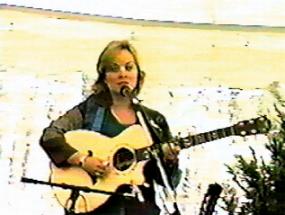 At the memorial service for Eva at Greenbelt Park, singer Grace Griffith performed a haunting Celtic-tinged version of “Golden Thread” that Eva would have loved. |